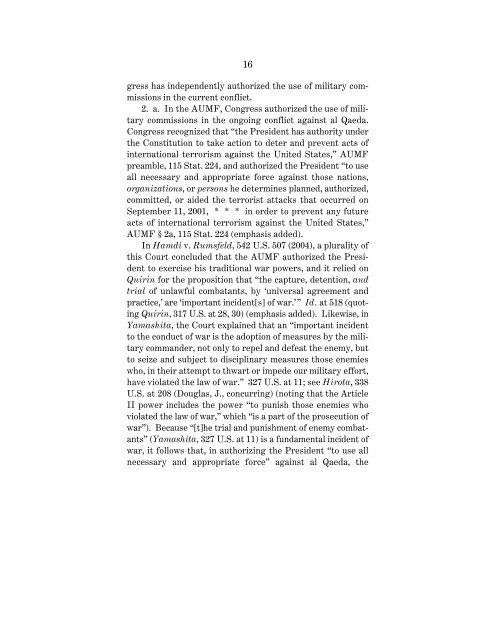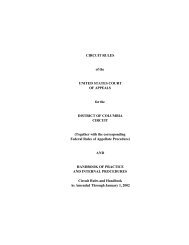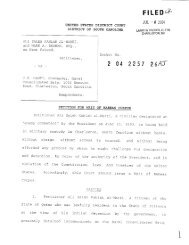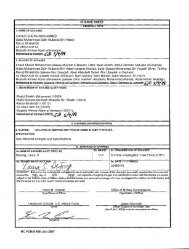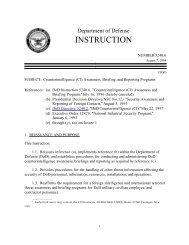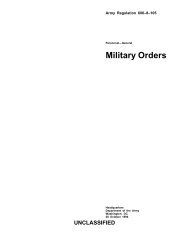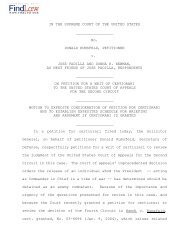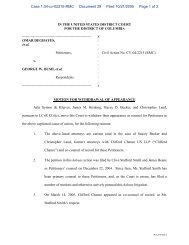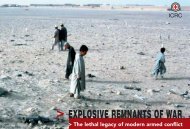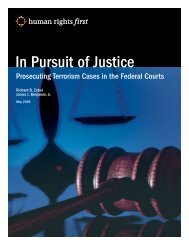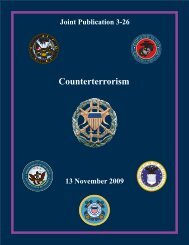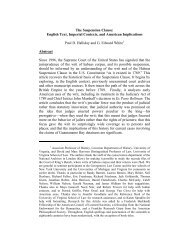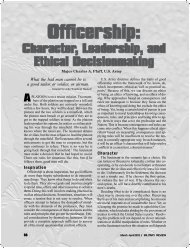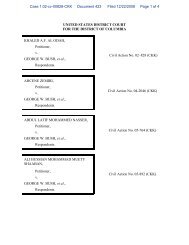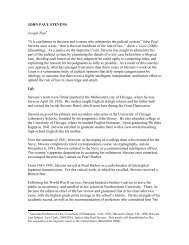Government Merits Brief - Hamdan v. Rumsfeld
Government Merits Brief - Hamdan v. Rumsfeld
Government Merits Brief - Hamdan v. Rumsfeld
Create successful ePaper yourself
Turn your PDF publications into a flip-book with our unique Google optimized e-Paper software.
16<br />
gress has independently authorized the use of military commissions<br />
in the current conflict.<br />
2. a. In the AUMF, Congress authorized the use of military<br />
commissions in the ongoing conflict against al Qaeda.<br />
Congress recognized that “the President has authority under<br />
the Constitution to take action to deter and prevent acts of<br />
international terrorism against the United States,” AUMF<br />
preamble, 115 Stat. 224, and authorized the President “to use<br />
all necessary and appropriate force against those nations,<br />
organizations, or persons he determines planned, authorized,<br />
committed, or aided the terrorist attacks that occurred on<br />
September 11, 2001, * * * in order to prevent any future<br />
acts of international terrorism against the United States,”<br />
AUMF § 2a, 115 Stat. 224 (emphasis added).<br />
In Hamdi v. <strong>Rumsfeld</strong>, 542 U.S. 507 (2004), a plurality of<br />
this Court concluded that the AUMF authorized the President<br />
to exercise his traditional war powers, and it relied on<br />
Quirin for the proposition that “the capture, detention, and<br />
trial of unlawful combatants, by ‘universal agreement and<br />
practice,’ are ‘important incident[s] of war.’” Id. at 518 (quoting<br />
Quirin, 317 U.S. at 28, 30) (emphasis added). Likewise, in<br />
Yamashita, the Court explained that an “important incident<br />
to the conduct of war is the adoption of measures by the military<br />
commander, not only to repel and defeat the enemy, but<br />
to seize and subject to disciplinary measures those enemies<br />
who, in their attempt to thwart or impede our military effort,<br />
have violated the law of war.” 327 U.S. at 11; see Hirota, 338<br />
U.S. at 208 (Douglas, J., concurring) (noting that the Article<br />
II power includes the power “to punish those enemies who<br />
violated the law of war,” which “is a part of the prosecution of<br />
war”). Because “[t]he trial and punishment of enemy combatants”<br />
(Yamashita, 327 U.S. at 11) is a fundamental incident of<br />
war, it follows that, in authorizing the President “to use all<br />
necessary and appropriate force” against al Qaeda, the


